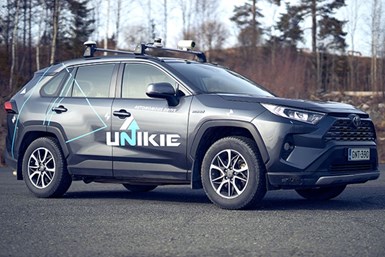Another Application for Geo-Fenced AVs: Factory Logistics
Partners team up on valet parking and other niches
There are a lot of new players—and partners—developing niche applications for autonomous driving systems.
This includes a pair of European startups—Finland-based Unikie and Germany’s Promotives—that are teaming up on everything from valet parking to industrial logistics.
Business Case
“The automation of logistically motivated driving on business grounds is a key market for us,” says Joachim Hauser, one of Promotives’ co-founders and former head of BMW’s Park Now unit.

Joachim Hauser (Image: Promotives)
“Businesses, such as OEM plants, car-logistics companies, rental car companies and big fleets are able to reduce costs and increase efficiency by having cars driven automatically on their business grounds.”
Parking…
In parking garages, customers will be able to drop off their cars, then let their vehicles find and drive themselves to open spaces. Several suppliers and OEMs are pilot testing such programs (Bosch, for example, is working with Ford and Mercedes).
Unikie and Promotives are targeting similar applications.
Rentals…

Unikie test car (Image: Unikie)
The partners also envision the concept being used at rental car facilities to deliver vehicles directly to customers (on site), without them having to walk to or be bused to a remote parking spot.
And Factories
Another potentially promising application the companies are pursuing is deploying self-driving technologies at car factories.
This could include driving vehicles off the assembly line and maneuvering them to parking areas or directly onto car carriers.
What They Do
Formed in 2015, Unikie specializes in machine vision and artificial intelligence systems for autonomous vehicles. The company has developed automated systems for mining trucks, wood-harvesting machines and other special vehicles. Clients include Nokia and Valmet.
Promotives, which was founded in 2016, provides HD mapping, 3D modeling and logistics management systems. The company has development programs with several carmakers, suppliers and tech companies, including Vodafone.
The parking and logistics applications would use sensor suites—including lidar—similar to those used for other autonomous vehicle functions, teamed with infrastructure transponders and detailed mapping systems.
What’s Next?
The partners plan to demonstrate the technology next September at the IAA show in Munich.
RELATED CONTENT
-
Mustang Changes for 2018
On Tuesday Ford unveiled—using the social media channels of actor Dwayne Johnson (this has got to unnerve some of the auto buff book editors)—the 2018 Mustang, which has undergone some modifications: under the hood (the 3.7-liter V6 is giving way to a 2.3-liter EcoBoost four, and a 10-speed automatic is available), on the dash (a 12-inch, all-digital LCD screen is available for the dashboard), at the tires (12 wheel choices), on the chassis (MagneRide damper technology is being offered with the Mustang Performance Package), and on the exterior (three new paint colors). And while on the subject of the exterior, there are some notable changes—a lower, remodeled hood, repositioned hood vents, new upper and lower front grilles, LED front lights, revised LED taillamps, new rear bumper and fascia.
-
BMW Uses Fabric Skin Again
In 2008 BMW revealed a concept vehicle that was unusual in that the body panels weren’t made from steel, aluminum or composites but, rather, a fabric that was fitted over an underlying metal frame.
-
On Electric Pickups, Flying Taxis, and Auto Industry Transformation
Ford goes for vertical integration, DENSO and Honeywell take to the skies, how suppliers feel about their customers, how vehicle customers feel about shopping, and insights from a software exec










